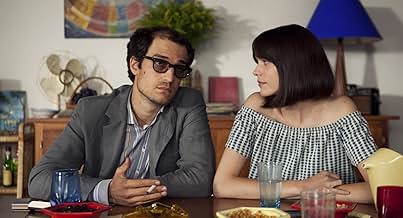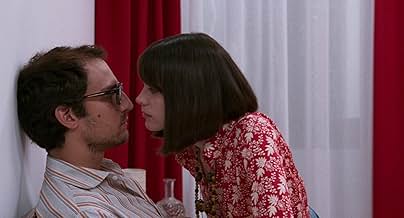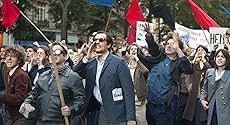IMDb-BEWERTUNG
6,6/10
6240
IHRE BEWERTUNG
Beim Dreh eines seiner Filme verliebt sich der französische Regisseur Jean-Luc Godard in die 17-jährige Schauspielerin Anne Wiazemsky, die er später heiratet.Beim Dreh eines seiner Filme verliebt sich der französische Regisseur Jean-Luc Godard in die 17-jährige Schauspielerin Anne Wiazemsky, die er später heiratet.Beim Dreh eines seiner Filme verliebt sich der französische Regisseur Jean-Luc Godard in die 17-jährige Schauspielerin Anne Wiazemsky, die er später heiratet.
- Regie
- Drehbuch
- Hauptbesetzung
- Auszeichnungen
- 10 Nominierungen insgesamt
Empfohlene Bewertungen
It is such a pity that it was not enough for the director to talk about Godard, he also tried to make a film in Godard's style. In my opinion, he was not able to capture the "Godard mood" at all. Instead, the film is executed in a textbook manner, meticulously using Godard's cinematic language like a receipt and that's always a risky move (for example, Gus Van Sant's case with Psycho). Godard is Godard not for using these elements, but because he used them at the right time and in the right way. If this would have been done by breaking new grounds in cinematic language, or even without breaking the mould in such a way BUT finding the right tone, I would have liked the film much more. Godard's world has a sexy, humorous yet tragic atmosphere, where the viewer feels for the characters. To be honest, when watching a Godard movie, I'm always terribly envious that I was not born at the time of Belmondo. Here, I did not feel this longing, sadly. Having said that, the actors are cute and the director seems to be cool and all, judging from interviews, so it may be that I'm just too sentimental. :)
At the beginning of 1968 Jean-Luc Godard is one of the most highly-respected directors working in French-language cinema. He is influential and admired. He has also just married Anne Wiazemsky, a teenage actress seventeen years his junior. He has the more arty end of the film world at his feet, yet he is feeling restless.
Then erupt the Paris student protests which sweep Godard up in their revolutionary fervour. He becomes a supporter of the movement, and his opinions are in turn sought out by the young leaders (although, in the best tradition of ideologues everywhere, they also spend a large amount of their time arguing). As his marriage to Wiazemsky suffers, Godard heads further down what some might describe as a Maoist path, culminating - for this film's purposes - in the establishment of a sort of film-making collective without heirarchy - Godard may be the director, but his artistic vision is subordinate to the will of the workers. Hah!
From the plot description this might seem like a terribly gloomy film; far from it. It is actually very playful: as Godard, Louis Garrel has to deliver directly to camera the line "I bet if you told an actor to say actors are dumb, he would do it"; and a scene where Godard and Wiazemsky (played by the frequently-undraped Stacy Martin) discuss film directors' enthusiasm for nude scenes is played with both actors naked. How accurate Garrel's portrayal is I am unable to say, but for an actor who has rarely before displayed any comedy chops he provides a fine, subtly comic turn here; I particularly like the hangdog look his Godard at times displays.
I am not massively familiar with either Godard or his work; I have little patience with pretention. But this film makes the famed auteur a more accessible - sometimes rather likeable - individual, without glossing over his faults (rudeness; arrogance; a controlling element in his relationship with Wiazemsky). Whether it is a fair representation of him I do not know, but it makes for a very interesting film.
I am not massively familiar with either Godard or his work; I have little patience with pretention. But this film makes the famed auteur a more accessible - sometimes rather likeable - individual, without glossing over his faults (rudeness; arrogance; a controlling element in his relationship with Wiazemsky). Whether it is a fair representation of him I do not know, but it makes for a very interesting film.
This bizarre mélange of genres--documentary, comedy, tell-all from a former lover--views above all like a hit job. This is the second film I encountered this week which focuses on a disgruntled former girlfriend´s unhappiness that her extraordinary lover turned out not to be entirely normal. (The other one was Mad to be Normal, about Scottish psychiatrist R.D. Laing). I find this sort of depiction of Godard, on the one hand, and R. D. Laing, on the other, to be disagreeable in the extreme. I have no difficulty believing that men with big personalities and egos are difficult to have relationships with. But to make an entire film about what a cad ¨the cad¨ is alleged to be (by a former lover) strikes me as an unvarnished act of revenge. Nietzsche (and probably Godard, since he has always liked Nietzsche) would surely identify in this production a consummate expression of ¨ressentiment¨.
It seems to me that there is something rather puerile about falling in love with someone who is an artist (touted by many as a creative genius) and then expecting him to suddenly be the average-joe husband and dad (in the case of R.D. Laing). How could that possibly turn out to be the case? It´s a package deal. You get the extraordinarily wonderful with the extraordinarily difficult to live with. Needless to say, I do not think well of the female protagonist here, who seems to have wanted to profit from what she viewed as her victimhood. Ugh.
I also found confusing that the director tried to imitate Godard´s style--part of the time, but not all of the time--while also trashing him. A confusing and unsatisfying creation, in my opinion. The comedic elements pretty much disappeared by the end, when all that remains is the whiny girlfriend and what is depicted as Godard´s descent into Maoist Marxism.
Godard haters will love this thrashing.
It seems to me that there is something rather puerile about falling in love with someone who is an artist (touted by many as a creative genius) and then expecting him to suddenly be the average-joe husband and dad (in the case of R.D. Laing). How could that possibly turn out to be the case? It´s a package deal. You get the extraordinarily wonderful with the extraordinarily difficult to live with. Needless to say, I do not think well of the female protagonist here, who seems to have wanted to profit from what she viewed as her victimhood. Ugh.
I also found confusing that the director tried to imitate Godard´s style--part of the time, but not all of the time--while also trashing him. A confusing and unsatisfying creation, in my opinion. The comedic elements pretty much disappeared by the end, when all that remains is the whiny girlfriend and what is depicted as Godard´s descent into Maoist Marxism.
Godard haters will love this thrashing.
Movies about real historical events and persons from everyday perspective are cool.
This one's about the legendary French director Jean-Luc Godard (played by Louis Garrel) reaching middle-age and marrying a young girl (Stacy Martin). It turns out Goddard, idolized by movie lovers and critcs, turns out to be the immature one in the relationship.
Like any good movie about relationships should, "Le redoutable" has both moments of laughter and soul wrenching drama. But above all, this is a character portrait of a increasingly domineering and unpleasant man.
Writer-director Michel Hazanavicius approaches the study of the character from the deep psychological standpoint. He does not offer some easy and populist way of explaining the reasons behind tormented genius's growing disagreeableness over time.
Just like in real life, there's no one single cause for how one behaves, especially not something external that would be easy to blame and would adequately summarize everything that's going on in human soul (bad influence, broken heart etc).
If the viewer is not willing or able to go that deep, there's still enough going on to justify the time spent. The movie is humorous - especially in the first half - and offers a vivid overview about how destructive immature people can become in loving relationship if they wrestle with power and intimacy issues.
In Godard's character, I found much of myself and what I've had to wrestle with in relationships - and still have to. So watching it was a bit depressing for me, for probably nobody enjoys seeing one's ow faults so clearly from aside (in others).
The second half turns increasingly darker in mood and get exhausting because there's basically only one situation filling the story which gets repeated over and over again. The lack of variety is the reason of me hesitating to give it higher score than 7 out of 10.
The story centers mostly on Godard and young wife, Anne Wiazemsky, and their performances are really good. These are demanding roles because the marital discord doesn't grow from one explosive conflict to another but accumulating stress and tension between two people, expressed mostly in subtle bodily or facial impressions that the camera eagerly catches.
This kind of inner burning based suspense is surely difficult to build on screen, and both stars are really good at it (with the help of the director, of course).
I enjoyed Stacy Martin's performance especially, for in a way, she has fewer resources to build the character than Garrel whose Godard does most of the talking.
Martin gives a beautifully restrained but emotive performance as the ever-suffering wife. She's the emotional backbone of the story and probably the one thing you'll remember the best from the movie.
Based on the memoir of Anne Wiazemsky, who became a novelist and published the book on her life with French cinema genius in 2015. Godard lives on, but she passed away just weeks ago, October 5th this year, succumbing to battle with breast cancer at the age of 70.
Michel Hazanavicius is best known for "The Artist" that got nominated for ten Oscars, and won five, in 2012, including for the best movie and director.
This one's about the legendary French director Jean-Luc Godard (played by Louis Garrel) reaching middle-age and marrying a young girl (Stacy Martin). It turns out Goddard, idolized by movie lovers and critcs, turns out to be the immature one in the relationship.
Like any good movie about relationships should, "Le redoutable" has both moments of laughter and soul wrenching drama. But above all, this is a character portrait of a increasingly domineering and unpleasant man.
Writer-director Michel Hazanavicius approaches the study of the character from the deep psychological standpoint. He does not offer some easy and populist way of explaining the reasons behind tormented genius's growing disagreeableness over time.
Just like in real life, there's no one single cause for how one behaves, especially not something external that would be easy to blame and would adequately summarize everything that's going on in human soul (bad influence, broken heart etc).
If the viewer is not willing or able to go that deep, there's still enough going on to justify the time spent. The movie is humorous - especially in the first half - and offers a vivid overview about how destructive immature people can become in loving relationship if they wrestle with power and intimacy issues.
In Godard's character, I found much of myself and what I've had to wrestle with in relationships - and still have to. So watching it was a bit depressing for me, for probably nobody enjoys seeing one's ow faults so clearly from aside (in others).
The second half turns increasingly darker in mood and get exhausting because there's basically only one situation filling the story which gets repeated over and over again. The lack of variety is the reason of me hesitating to give it higher score than 7 out of 10.
The story centers mostly on Godard and young wife, Anne Wiazemsky, and their performances are really good. These are demanding roles because the marital discord doesn't grow from one explosive conflict to another but accumulating stress and tension between two people, expressed mostly in subtle bodily or facial impressions that the camera eagerly catches.
This kind of inner burning based suspense is surely difficult to build on screen, and both stars are really good at it (with the help of the director, of course).
I enjoyed Stacy Martin's performance especially, for in a way, she has fewer resources to build the character than Garrel whose Godard does most of the talking.
Martin gives a beautifully restrained but emotive performance as the ever-suffering wife. She's the emotional backbone of the story and probably the one thing you'll remember the best from the movie.
Based on the memoir of Anne Wiazemsky, who became a novelist and published the book on her life with French cinema genius in 2015. Godard lives on, but she passed away just weeks ago, October 5th this year, succumbing to battle with breast cancer at the age of 70.
Michel Hazanavicius is best known for "The Artist" that got nominated for ten Oscars, and won five, in 2012, including for the best movie and director.
Godard is not the sort of typical subject for a film. To say he lacks empathy, that he assaults the cosy preconceptions of much cinema and its audiences, is well-known.
At the time of this film he was undergoing a transition: he renounced his break-through films, he was intensely political in that celebrity French style which is often more pose and belles-lettres, than real accomplishment, a fact made clear in this film.
To present him in that anodyne fashion which Hollywood does, which is essential deceitful, as say "A Beautiful Mind" and many other movies, would be truly dishonest but fortunately this film does not do that. It is quite a good presentation of that period, both socially-politically and personally.
The film's style naturally, almost logically, had to be á la Godard, in some way, and it works without being pastiche. At times it pushes a little far but mostly enough to give that sense of how Godard's films looked at that time and before.
This is especially true of the interiors, a favorite setting and device of Godard's in the 1960s, where he had couples discuss and debate as they moved about apartments. Here the famous sequence in "Contempt" when Piccoli and Bardot's marriage ended is almost reprised as Godard and Wiazemsky's relationship shatters. The inspirational touch in this film was to add Richard Strauss's luscious but fatalistic song, Im Abendrot (At Sunset), over this sequence.
The performances are all done well. A little more lisp from Garrel's Godard perhaps, but really, technically and the overall production, the whole movie looks just right.
Well worth the time and a reminder that once films, and cinema generally, actually mattered socially and politically.
At the time of this film he was undergoing a transition: he renounced his break-through films, he was intensely political in that celebrity French style which is often more pose and belles-lettres, than real accomplishment, a fact made clear in this film.
To present him in that anodyne fashion which Hollywood does, which is essential deceitful, as say "A Beautiful Mind" and many other movies, would be truly dishonest but fortunately this film does not do that. It is quite a good presentation of that period, both socially-politically and personally.
The film's style naturally, almost logically, had to be á la Godard, in some way, and it works without being pastiche. At times it pushes a little far but mostly enough to give that sense of how Godard's films looked at that time and before.
This is especially true of the interiors, a favorite setting and device of Godard's in the 1960s, where he had couples discuss and debate as they moved about apartments. Here the famous sequence in "Contempt" when Piccoli and Bardot's marriage ended is almost reprised as Godard and Wiazemsky's relationship shatters. The inspirational touch in this film was to add Richard Strauss's luscious but fatalistic song, Im Abendrot (At Sunset), over this sequence.
The performances are all done well. A little more lisp from Garrel's Godard perhaps, but really, technically and the overall production, the whole movie looks just right.
Well worth the time and a reminder that once films, and cinema generally, actually mattered socially and politically.
Wusstest du schon
- WissenswertesJean-Luc Godard himself called the movie a "stupid, stupid idea". The creators of the film then put this quote on the poster in very large font.
- Zitate
Jean-Luc Godard: Politics is like shoes. There's a left and a right, but eventually you will want to go barefoot.
- VerbindungenFeatured in Filmmelier Drops: O formidável Godard, o cinema e a política (2018)
- SoundtracksAdagio from Piano Sonata No.12 in F, K.332
Written by Wolfgang Amadeus Mozart
Performed by Maria João Pires
Top-Auswahl
Melde dich zum Bewerten an und greife auf die Watchlist für personalisierte Empfehlungen zu.
- How long is Godard Mon Amour?Powered by Alexa
Details
- Erscheinungsdatum
- Herkunftsländer
- Offizieller Standort
- Sprachen
- Auch bekannt als
- Yo, Godard
- Drehorte
- Paris, Frankreich(scenes in Paris in 1967 and 1968)
- Produktionsfirmen
- Weitere beteiligte Unternehmen bei IMDbPro anzeigen
Box Office
- Budget
- 11.110.000 € (geschätzt)
- Bruttoertrag in den USA und Kanada
- 82.264 $
- Eröffnungswochenende in den USA und in Kanada
- 10.994 $
- 22. Apr. 2018
- Weltweiter Bruttoertrag
- 1.332.204 $
- Laufzeit1 Stunde 47 Minuten
- Farbe
- Seitenverhältnis
- 1.85 : 1
Zu dieser Seite beitragen
Bearbeitung vorschlagen oder fehlenden Inhalt hinzufügen

Oberste Lücke
By what name was Godard Mon Amour (2017) officially released in India in English?
Antwort
































